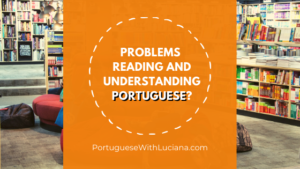
If you are learning Portuguese or any foreign language, it’s good for you to know these 2 styles of reading: intensive reading and extensive reading.
It’s good for you to learn about these 2 styles so you’ll do things right when it comes to reading different kinds of texts.
Intensive reading is:
- Short texts
- Hard to read (reading is slow)
- Full of new words
- Aimed to study the passage deeply
And extensive reading is:
- Longer texts
- Easy to read (reading is fast)
- Some new words
- For pleasure (and to improve general language skills)
Don’t mix these 2 styles, like using a hard advanced book as intensive reading. You’ll get tired and it’s going to be frustrating for you!
Also, if you are reading for pleasure, don’t feel you have to write down or look up every single word you don’t know. By doing that you’ll just lose your time with the book.
They are different styles of reading. They are both important and will help you advance in Portuguese!
My tips for this blog post is on EXTENSIVE reading:
1. Don’t translate each word
 If you start translating each word or sentence, you aren’t reading a book, you are doing translation work! And this is not the point when you want to READ in Portuguese.
If you start translating each word or sentence, you aren’t reading a book, you are doing translation work! And this is not the point when you want to READ in Portuguese.
What I do: when I’m reading in a foreign language I only translate sentences that are confusing for me.
If I read a sentence twice and don’t get the meaning of it, I stop, go back to the previous paragraph and read more carefully. If I still can’t understand it, then I translate.
2. Don’t look up every word you don’t understand
This is almost the same as above. If you stop reading every time you find a word you don’t understand you won’t advance in the story.
Imagine for every page you read you stop once to look up a word in the dictionary? For me, it’s boring! And doesn’t feel natural. You don’t do it when you are reading in your native language, why would you do it when reading in Portuguese?
What I do: there are 3 situations when I stop to look up words in the dictionary:
- when I feel the word is very important in the paragraph or the book (if I don’t know it I won’t be able to understand well).
- when the word repeats many times and even so I can’t get the meaning of it.
- when the meaning I know for the word doesn’t make sense in the sentence.
3. Keep reading

This is extensive reading, you have to keep reading! Even if you don’t understand everything in the book, you should be able to read almost as if you were reading in your native language.
But, if you start a book and feel it’s hard for you, you should put it off until you reach the level for it.
What I do: If I enjoy the book and understand well, I keep reading it! Also because I’ve noticed that it gets easier and faster as the story advances. The last fiction I read in English was “City of Girls”, by Elizabeth Gilbert. It’s in New York in the 40s and she uses language from the 40s, a lot of new vocab for me.
As I said, the beginning of the book was harder, I had to get used to a lot of words that repeated throughout the book. As I got used to them, reading got easier and faster! It’s a matter of persistence.
4. Get familiar with the subject before reading
Observe the book cover, the back cover and read everything that’s in the book. Don’t jump straight to the story.
While observing these parts, if you see something unfamiliar or get curious about a subject, google it!
Read about the author, about the places, historical events, anything mentioned in the covers or before and after the story. Having all this information in mind might help you understand the book.
What I do: I always read about the author on Wikipedia. Where and when he or she was born, other jobs they’ve had, their influences, etc.
As I like historical fiction, I also read about the period covered in the book and the real characters that are important in the book. I must say that I look for this kind of information before, but also during my readings.
5. Read what you like
You are reading in Portuguese, this adds a challenge, so read what you like. I’d never pick a horror book to read in my native language so I won’t do it in a foreign language!
What I do: When I’m reading for fun or to relax, I only read what I like – in any language! And if I start reading a book and the story doesn’t catch my attention as it advances I don’t finish reading it!
My last bonus tip:
Enjoy!
Extensive reading has to be enjoyable! This is not an intensive reading where you read a passage to learn new vocabulary or grammar points (sometimes you don’t even like the subject). Extensive reading is meant for pleasure while you improve your overall language competences.
And it feels good when you say that you finished a book in your target language! This feeling of accomplishment is very important when you are learning anything! It makes you want to keep learning it!
I hope this post helped you and if you want to keep reading about it, check this one here!
Sign up here to received the first chapter for free!



